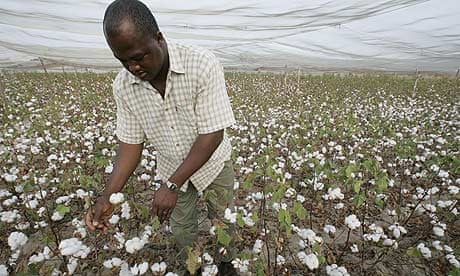Unlike the argument recently put forward by Daniel Church, three reports published this month have documented the benefits of GM crops around the world. A review of peer-reviewed surveys of farmers worldwide who are using the technology compared to farmers who continue to plant conventional crops, published last week in Nature Biotechnology, found that by and large farmers have benefited. Another report released last week by the National Research Council in the US concluded that many American farmers have achieved more cost-effective weed control and reduced losses from insect pests. And a survey of farmers in Brazil, which is a leader in global adoption of GM crops, shows benefits for soybean, cotton and corn growers. New technologies, such as Bt aubergine, promise additional gains to farmers if allowed for commercial release, despite the debate inspired by a recent moratorium in India.
Last year, 14 million farmers in 25 countries grew GM crops commercially, over 90% of them small farmers in developing countries, according to ISAAA. I've been studying the impacts of GM crops for the past 12 years. Given the growth in adoption rates around the world and the increasing number of studies that have been done to assess the impact of the technology on farmers, I was interested in looking at how the results of all these studies stacked up. In my review of global farmer surveys, results from 12 countries indicate that most surveyed farmers have increased yields, decreased costs and improved economic performance. The benefits were found to be greatest for the mostly small farmers in developing countries. The average yield improvements for developing countries range from 16% for insect-resistant corn to 30% for insect-resistant cotton, with an 85% yield increase observed in a single study on herbicide-tolerant corn. On average, developed-country farmers' reported yield increases range from no change for herbicide-tolerant cotton to a 7% increase for insect-resistant cotton.
It is often claimed that biotech crops are more expensive for farmers. However, the evidence shows that while seed costs (including technology fees) were nearly always higher for farmers who planted GM crops, this was usually offset by decreased costs of pesticides. The combination of increased yields and decreased costs has translated to improved economic performance in nearly three-quarters of the cases studied. And the economic advantage may be even greater, as surveys have also found that farmers value additional cost savings that are not included in a traditional accounting of costs, such as management time savings, human and environmental safety and reduced yield risk.
GM crops were also found to help agriculture play a crucial role in preserving the natural environment by reducing the number of insecticide applications on insect-resistant crops and facilitating reduced tillage on herbicide-tolerant crops.
In addition to economic benefits, the NRC study also documented environmental gains. The NRC study was conducted by an expert committee of 10 academic researchers from across the country which reviewed the available evidence on the impacts of GM crops in the US. Environmental benefits included reduced insecticide use on insect-resistant corn and cotton. The panel concluded that the soil and water quality improvements resulting from reduced tillage could be the greatest environmental benefit of GM crops, but is poorly tracked to date.
The Brazilian study was conducted by Céleres Ambiental, a Brazilian consultancy that has been monitoring the impact of GM crops in Brazil for the local seed industry. The survey covered 360 farmers from 10 states, finding that the aggregate benefits of the technology reached $3.6bn. The largest share of the benefits was due to reduced production costs. Yield gains were observed primarily for cotton and corn.
The benefits of already commercialised GM crop technology have been demonstrated, the result of the spillover of technologies originally targeted at farmers in industrialised countries. Field trials in India with Bt aubergine found a 42% reduction in total insecticide use and 100% increase in yields over similar non-Bt varieties. While farmers may not achieve the results of the trials, the potential benefits remain substantial. As technologies like Bt aubergine reach commercialisation, it will be interesting to observe farmer experiences with GM crop technologies that have been developed specifically for the needs of developing-country farmers.
